A Critical Review of Economic Theory in International Business
VerifiedAdded on 2023/04/12
|5
|1093
|470
Essay
AI Summary
This essay provides a critical review of an article focusing on the shift in international business theories from the OLI paradigm to a model emphasizing firm-specific and location-specific advantages. It highlights the limitations of conventional theories, particularly concerning supply chain perspectives and offshore licensing. The analysis contrasts market-seeking, asset-seeking, and resource-seeking investments, emphasizing the importance of strategy and national economic conditions over firm size in international trade. The review concludes that conventional OLI-based theories have become outdated due to introduced complexities and failure to incorporate current international trading practices, advocating for a continuous evolution of international business theories to reflect changing global trade scenarios. Desklib offers a range of resources, including solved assignments and past papers, to support students in their academic endeavors.
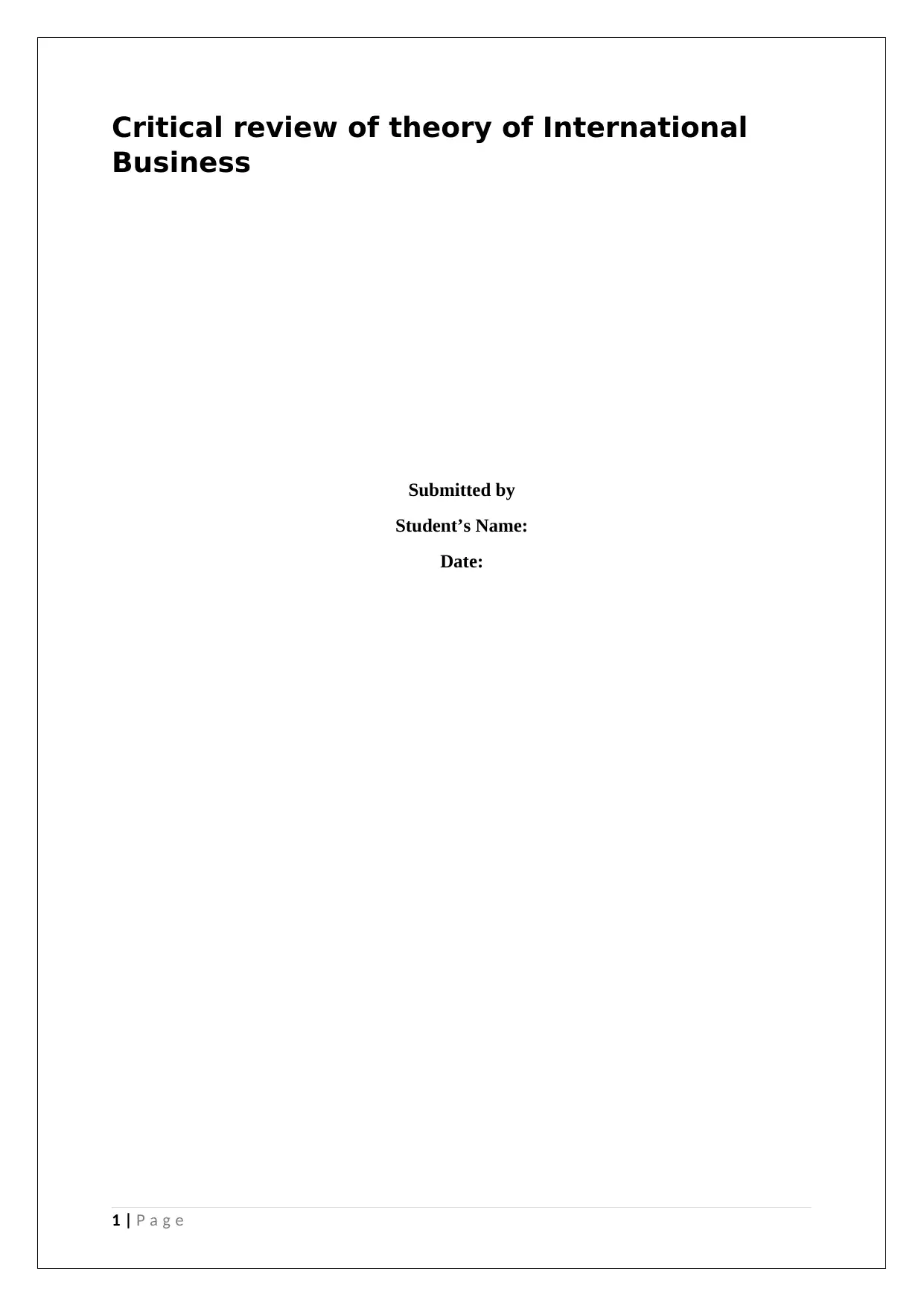
Critical review of theory of International
Business
Submitted by
Student’s Name:
Date:
1 | P a g e
Business
Submitted by
Student’s Name:
Date:
1 | P a g e
Paraphrase This Document
Need a fresh take? Get an instant paraphrase of this document with our AI Paraphraser
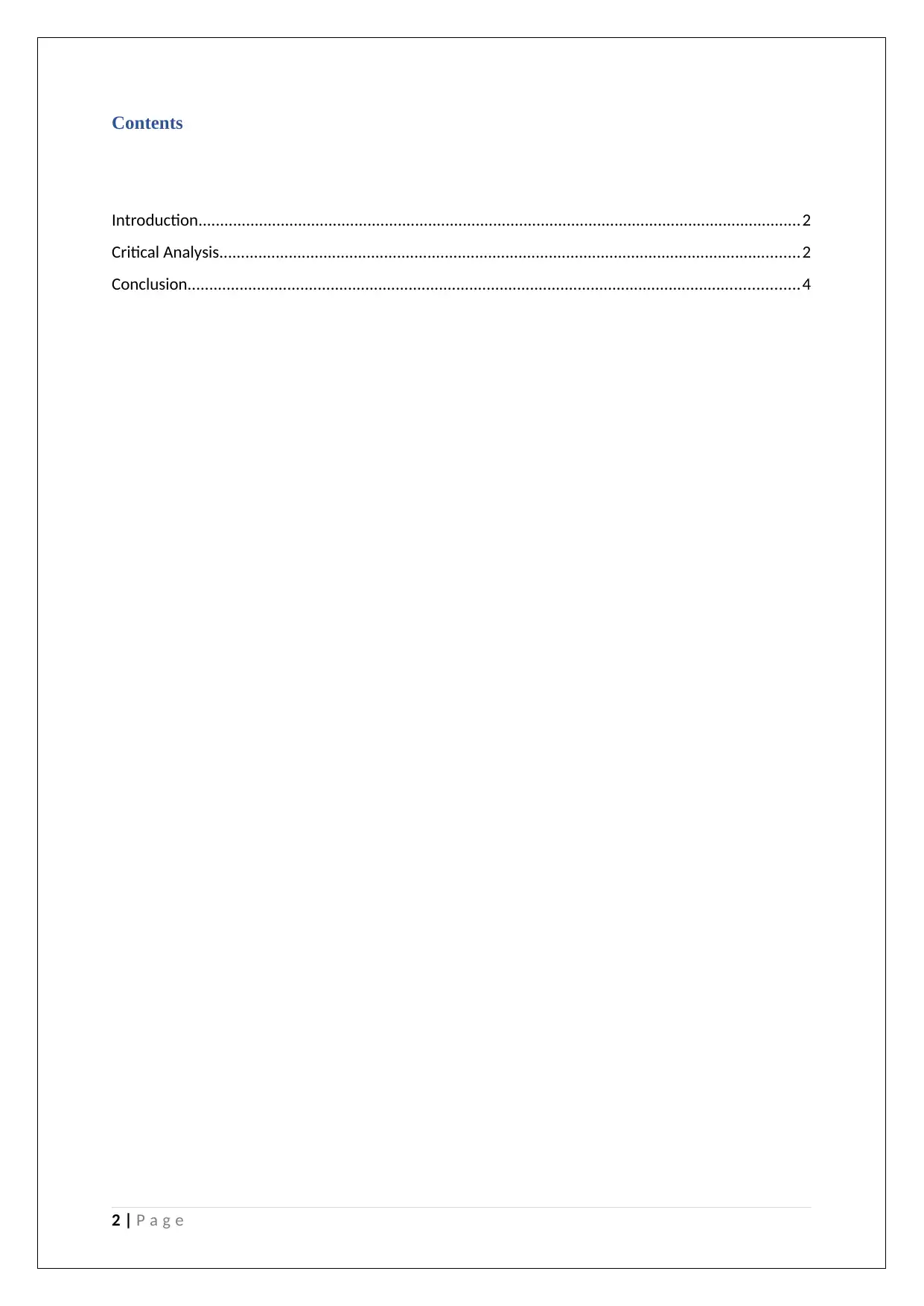
Contents
Introduction...........................................................................................................................................2
Critical Analysis......................................................................................................................................2
Conclusion.............................................................................................................................................4
2 | P a g e
Introduction...........................................................................................................................................2
Critical Analysis......................................................................................................................................2
Conclusion.............................................................................................................................................4
2 | P a g e
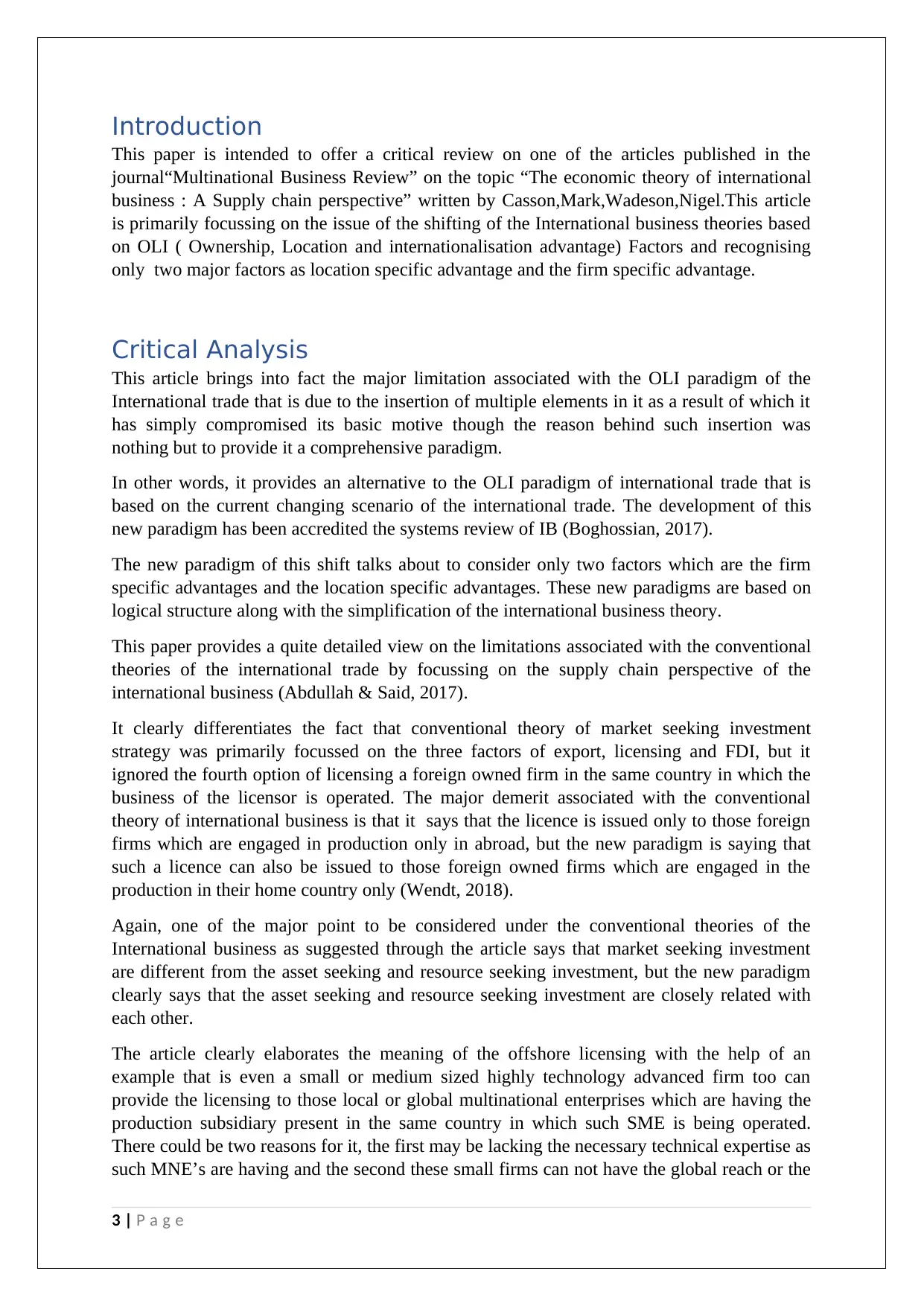
Introduction
This paper is intended to offer a critical review on one of the articles published in the
journal“Multinational Business Review” on the topic “The economic theory of international
business : A Supply chain perspective” written by Casson,Mark,Wadeson,Nigel.This article
is primarily focussing on the issue of the shifting of the International business theories based
on OLI ( Ownership, Location and internationalisation advantage) Factors and recognising
only two major factors as location specific advantage and the firm specific advantage.
Critical Analysis
This article brings into fact the major limitation associated with the OLI paradigm of the
International trade that is due to the insertion of multiple elements in it as a result of which it
has simply compromised its basic motive though the reason behind such insertion was
nothing but to provide it a comprehensive paradigm.
In other words, it provides an alternative to the OLI paradigm of international trade that is
based on the current changing scenario of the international trade. The development of this
new paradigm has been accredited the systems review of IB (Boghossian, 2017).
The new paradigm of this shift talks about to consider only two factors which are the firm
specific advantages and the location specific advantages. These new paradigms are based on
logical structure along with the simplification of the international business theory.
This paper provides a quite detailed view on the limitations associated with the conventional
theories of the international trade by focussing on the supply chain perspective of the
international business (Abdullah & Said, 2017).
It clearly differentiates the fact that conventional theory of market seeking investment
strategy was primarily focussed on the three factors of export, licensing and FDI, but it
ignored the fourth option of licensing a foreign owned firm in the same country in which the
business of the licensor is operated. The major demerit associated with the conventional
theory of international business is that it says that the licence is issued only to those foreign
firms which are engaged in production only in abroad, but the new paradigm is saying that
such a licence can also be issued to those foreign owned firms which are engaged in the
production in their home country only (Wendt, 2018).
Again, one of the major point to be considered under the conventional theories of the
International business as suggested through the article says that market seeking investment
are different from the asset seeking and resource seeking investment, but the new paradigm
clearly says that the asset seeking and resource seeking investment are closely related with
each other.
The article clearly elaborates the meaning of the offshore licensing with the help of an
example that is even a small or medium sized highly technology advanced firm too can
provide the licensing to those local or global multinational enterprises which are having the
production subsidiary present in the same country in which such SME is being operated.
There could be two reasons for it, the first may be lacking the necessary technical expertise as
such MNE’s are having and the second these small firms can not have the global reach or the
3 | P a g e
This paper is intended to offer a critical review on one of the articles published in the
journal“Multinational Business Review” on the topic “The economic theory of international
business : A Supply chain perspective” written by Casson,Mark,Wadeson,Nigel.This article
is primarily focussing on the issue of the shifting of the International business theories based
on OLI ( Ownership, Location and internationalisation advantage) Factors and recognising
only two major factors as location specific advantage and the firm specific advantage.
Critical Analysis
This article brings into fact the major limitation associated with the OLI paradigm of the
International trade that is due to the insertion of multiple elements in it as a result of which it
has simply compromised its basic motive though the reason behind such insertion was
nothing but to provide it a comprehensive paradigm.
In other words, it provides an alternative to the OLI paradigm of international trade that is
based on the current changing scenario of the international trade. The development of this
new paradigm has been accredited the systems review of IB (Boghossian, 2017).
The new paradigm of this shift talks about to consider only two factors which are the firm
specific advantages and the location specific advantages. These new paradigms are based on
logical structure along with the simplification of the international business theory.
This paper provides a quite detailed view on the limitations associated with the conventional
theories of the international trade by focussing on the supply chain perspective of the
international business (Abdullah & Said, 2017).
It clearly differentiates the fact that conventional theory of market seeking investment
strategy was primarily focussed on the three factors of export, licensing and FDI, but it
ignored the fourth option of licensing a foreign owned firm in the same country in which the
business of the licensor is operated. The major demerit associated with the conventional
theory of international business is that it says that the licence is issued only to those foreign
firms which are engaged in production only in abroad, but the new paradigm is saying that
such a licence can also be issued to those foreign owned firms which are engaged in the
production in their home country only (Wendt, 2018).
Again, one of the major point to be considered under the conventional theories of the
International business as suggested through the article says that market seeking investment
are different from the asset seeking and resource seeking investment, but the new paradigm
clearly says that the asset seeking and resource seeking investment are closely related with
each other.
The article clearly elaborates the meaning of the offshore licensing with the help of an
example that is even a small or medium sized highly technology advanced firm too can
provide the licensing to those local or global multinational enterprises which are having the
production subsidiary present in the same country in which such SME is being operated.
There could be two reasons for it, the first may be lacking the necessary technical expertise as
such MNE’s are having and the second these small firms can not have the global reach or the
3 | P a g e
⊘ This is a preview!⊘
Do you want full access?
Subscribe today to unlock all pages.

Trusted by 1+ million students worldwide
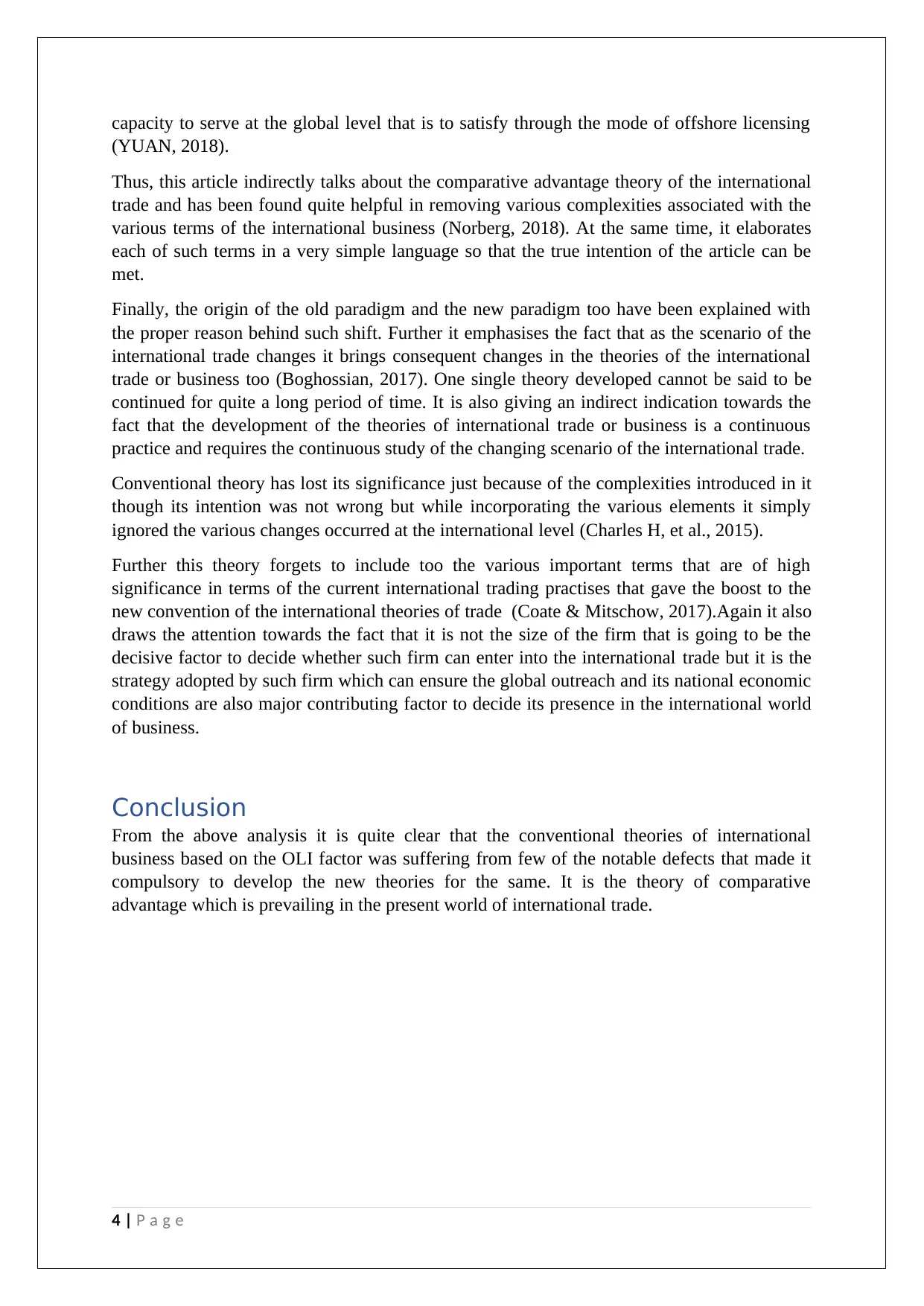
capacity to serve at the global level that is to satisfy through the mode of offshore licensing
(YUAN, 2018).
Thus, this article indirectly talks about the comparative advantage theory of the international
trade and has been found quite helpful in removing various complexities associated with the
various terms of the international business (Norberg, 2018). At the same time, it elaborates
each of such terms in a very simple language so that the true intention of the article can be
met.
Finally, the origin of the old paradigm and the new paradigm too have been explained with
the proper reason behind such shift. Further it emphasises the fact that as the scenario of the
international trade changes it brings consequent changes in the theories of the international
trade or business too (Boghossian, 2017). One single theory developed cannot be said to be
continued for quite a long period of time. It is also giving an indirect indication towards the
fact that the development of the theories of international trade or business is a continuous
practice and requires the continuous study of the changing scenario of the international trade.
Conventional theory has lost its significance just because of the complexities introduced in it
though its intention was not wrong but while incorporating the various elements it simply
ignored the various changes occurred at the international level (Charles H, et al., 2015).
Further this theory forgets to include too the various important terms that are of high
significance in terms of the current international trading practises that gave the boost to the
new convention of the international theories of trade (Coate & Mitschow, 2017).Again it also
draws the attention towards the fact that it is not the size of the firm that is going to be the
decisive factor to decide whether such firm can enter into the international trade but it is the
strategy adopted by such firm which can ensure the global outreach and its national economic
conditions are also major contributing factor to decide its presence in the international world
of business.
Conclusion
From the above analysis it is quite clear that the conventional theories of international
business based on the OLI factor was suffering from few of the notable defects that made it
compulsory to develop the new theories for the same. It is the theory of comparative
advantage which is prevailing in the present world of international trade.
4 | P a g e
(YUAN, 2018).
Thus, this article indirectly talks about the comparative advantage theory of the international
trade and has been found quite helpful in removing various complexities associated with the
various terms of the international business (Norberg, 2018). At the same time, it elaborates
each of such terms in a very simple language so that the true intention of the article can be
met.
Finally, the origin of the old paradigm and the new paradigm too have been explained with
the proper reason behind such shift. Further it emphasises the fact that as the scenario of the
international trade changes it brings consequent changes in the theories of the international
trade or business too (Boghossian, 2017). One single theory developed cannot be said to be
continued for quite a long period of time. It is also giving an indirect indication towards the
fact that the development of the theories of international trade or business is a continuous
practice and requires the continuous study of the changing scenario of the international trade.
Conventional theory has lost its significance just because of the complexities introduced in it
though its intention was not wrong but while incorporating the various elements it simply
ignored the various changes occurred at the international level (Charles H, et al., 2015).
Further this theory forgets to include too the various important terms that are of high
significance in terms of the current international trading practises that gave the boost to the
new convention of the international theories of trade (Coate & Mitschow, 2017).Again it also
draws the attention towards the fact that it is not the size of the firm that is going to be the
decisive factor to decide whether such firm can enter into the international trade but it is the
strategy adopted by such firm which can ensure the global outreach and its national economic
conditions are also major contributing factor to decide its presence in the international world
of business.
Conclusion
From the above analysis it is quite clear that the conventional theories of international
business based on the OLI factor was suffering from few of the notable defects that made it
compulsory to develop the new theories for the same. It is the theory of comparative
advantage which is prevailing in the present world of international trade.
4 | P a g e
Paraphrase This Document
Need a fresh take? Get an instant paraphrase of this document with our AI Paraphraser
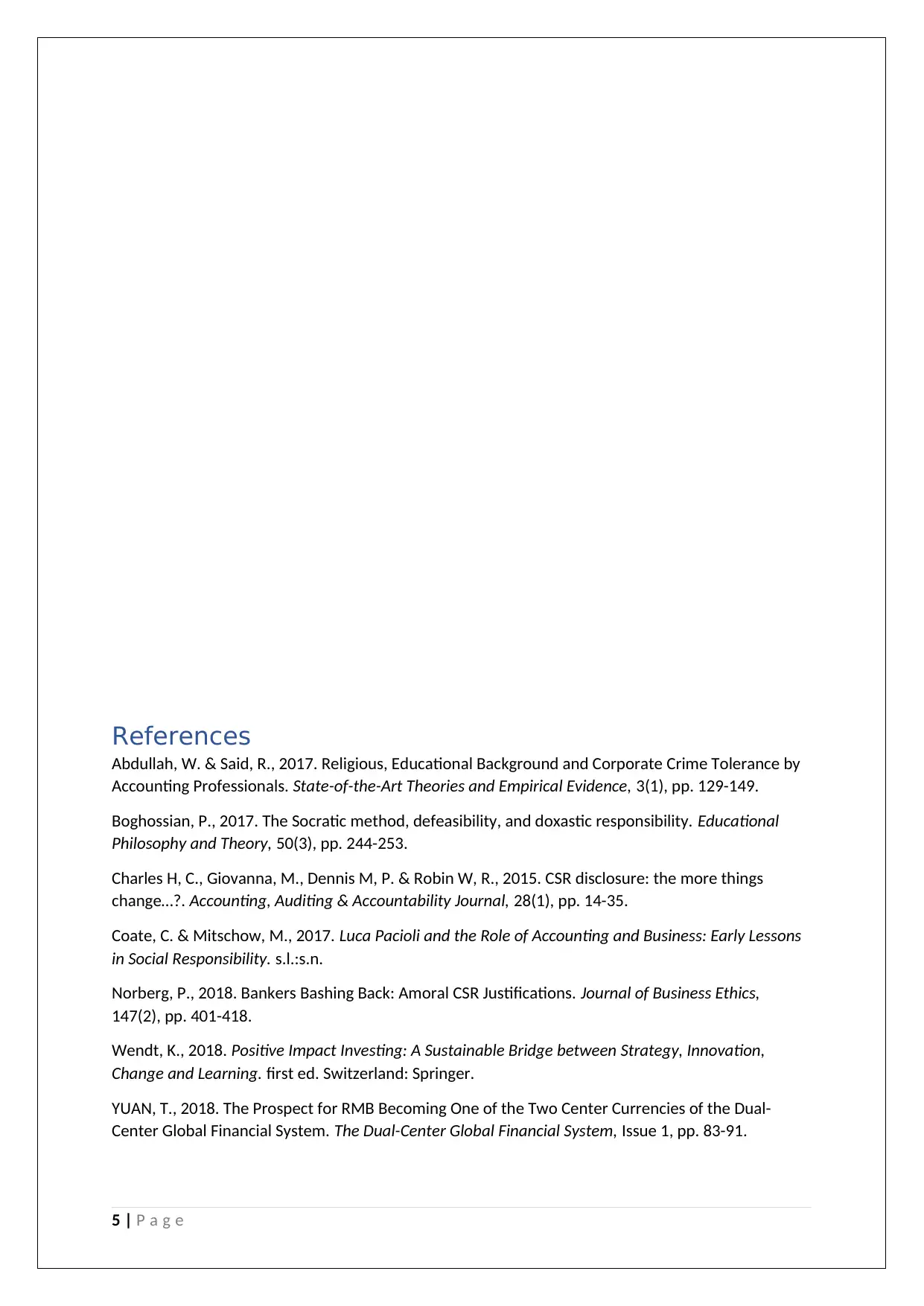
References
Abdullah, W. & Said, R., 2017. Religious, Educational Background and Corporate Crime Tolerance by
Accounting Professionals. State-of-the-Art Theories and Empirical Evidence, 3(1), pp. 129-149.
Boghossian, P., 2017. The Socratic method, defeasibility, and doxastic responsibility. Educational
Philosophy and Theory, 50(3), pp. 244-253.
Charles H, C., Giovanna, M., Dennis M, P. & Robin W, R., 2015. CSR disclosure: the more things
change…?. Accounting, Auditing & Accountability Journal, 28(1), pp. 14-35.
Coate, C. & Mitschow, M., 2017. Luca Pacioli and the Role of Accounting and Business: Early Lessons
in Social Responsibility. s.l.:s.n.
Norberg, P., 2018. Bankers Bashing Back: Amoral CSR Justifications. Journal of Business Ethics,
147(2), pp. 401-418.
Wendt, K., 2018. Positive Impact Investing: A Sustainable Bridge between Strategy, Innovation,
Change and Learning. first ed. Switzerland: Springer.
YUAN, T., 2018. The Prospect for RMB Becoming One of the Two Center Currencies of the Dual-
Center Global Financial System. The Dual-Center Global Financial System, Issue 1, pp. 83-91.
5 | P a g e
Abdullah, W. & Said, R., 2017. Religious, Educational Background and Corporate Crime Tolerance by
Accounting Professionals. State-of-the-Art Theories and Empirical Evidence, 3(1), pp. 129-149.
Boghossian, P., 2017. The Socratic method, defeasibility, and doxastic responsibility. Educational
Philosophy and Theory, 50(3), pp. 244-253.
Charles H, C., Giovanna, M., Dennis M, P. & Robin W, R., 2015. CSR disclosure: the more things
change…?. Accounting, Auditing & Accountability Journal, 28(1), pp. 14-35.
Coate, C. & Mitschow, M., 2017. Luca Pacioli and the Role of Accounting and Business: Early Lessons
in Social Responsibility. s.l.:s.n.
Norberg, P., 2018. Bankers Bashing Back: Amoral CSR Justifications. Journal of Business Ethics,
147(2), pp. 401-418.
Wendt, K., 2018. Positive Impact Investing: A Sustainable Bridge between Strategy, Innovation,
Change and Learning. first ed. Switzerland: Springer.
YUAN, T., 2018. The Prospect for RMB Becoming One of the Two Center Currencies of the Dual-
Center Global Financial System. The Dual-Center Global Financial System, Issue 1, pp. 83-91.
5 | P a g e
1 out of 5
Related Documents
Your All-in-One AI-Powered Toolkit for Academic Success.
+13062052269
info@desklib.com
Available 24*7 on WhatsApp / Email
![[object Object]](/_next/static/media/star-bottom.7253800d.svg)
Unlock your academic potential
Copyright © 2020–2026 A2Z Services. All Rights Reserved. Developed and managed by ZUCOL.





